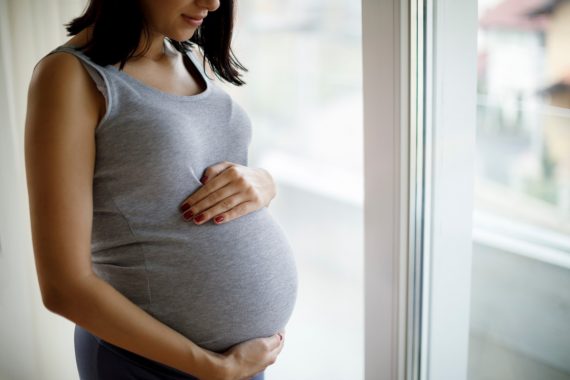NICE: GPs should routinely ask pregnant women about drinking and record details

GPs should routinely ask pregnant women how much alcohol they are drinking, and record the answer, NICE has recommended.
Under new quality standards for improving the diagnosis, assessment and prevention of fetal alcohol spectrum disorder (FASD), health professionals should also advise pregnant women not to drink any alcohol because there is no known safe level.
The medical record should reflect ‘the number and types of alcoholic drinks consumed, as well as the pattern and frequency of drinking’, said NICE.
But an earlier draft recommendation that a mother’s alcohol consumption should also be included on the child’s medical records has been dropped after concerns that it would lead women to not answer questions around drinking honestly.
The standards also said that:
- Children and young people with probable exposure to alcohol in the womb and significant physical, developmental, or behavioural difficulties should be referred for assessment.
- Children with confirmed prenatal alcohol exposure or all three facial features associated with prenatal alcohol exposure get a neurodevelopmental assessment if there are clinical concerns.
- Children and young people diagnosed with FASD should have a management plan in place.
Dr Paul Chrisp, director of NICE’s centre for guidelines, said children and young people with FASD often have a poorer quality of life and must overcome some incredibly difficult challenges in their daily lives.
‘This quality standard aims to improve the diagnosis and care offered to children and young people with FASD as well as ensuring that women are given consistent advice about their alcohol consumption during pregnancy.
He added: ‘Data on the number of children and young people in the UK with FASD are limited, with no single reliable source. It’s important that we have clearly defined areas for improvement in place to reflect national priorities, promote best practice and help all those involved in delivering services to provide the very highest levels of care.’
The British Pregnancy Advisory Service (BPAS) were among those who raised objections about the draft recommendation that alcohol use during pregnancy should also be recorded on the child’s medical notes because it would infringe on a woman’s right to privacy and impact clinicians’ ability to have frank and confidential discussions.
Clare Murphy, BPAS chief executive, said: ‘We welcome the decision by NICE to drop proposals to automatically transfer any alcohol consumption reported by a pregnant woman to her child’s medical records.
‘It is absolutely staggering that these measures, which had no basis in evidence and would have amounted to an extraordinary infringement on women’s right to privacy, were ever suggested by NICE in the first place.
But she added they remained concerned about the routine questioning of women throughout pregnancy on the issue of alcohol consumption.
‘Our research shows women find antenatal discussions about alcohol – even when they don’t drink at all – can supercede other issues important to them, like their own mental health and wellbeing.
‘Those supporting pregnant women must be able to provide care that meets the needs of the individual before them, not just to fill in boxes on a checklist.’
What is the advice for GPs?
Healthcare professionals (midwives, nurses and doctors) ask pregnant women about their alcohol consumption and discuss the associated risks.
They use a non-judgemental approach, discuss any concerns and provide support according to the woman’s needs.
They record information on a woman’s alcohol consumption during pregnancy in her maternity records at antenatal appointments, including the number and types of alcoholic drinks consumed, as well as the pattern and frequency of drinking.
Source: NICE
Visit Pulse Reference for details on 140 symptoms, including easily searchable symptoms and categories, offering you a free platform to check symptoms and receive potential diagnoses during consultations.
Related Articles
READERS' COMMENTS [7]
Please note, only GPs are permitted to add comments to articles










Midwives should ask pregnant women about their drinking surely. I hardly ever see pregnant women unless unwell when their drinking is not top of the jobs to do pile.
Exactly David Jarvis.
NICE obviously doesn’t know much about how the modern antenatal system works – but then the coal face has always been far away from the ivory tower.
Not relevant in 2022. Nanny state is boring.
The only thing I can immediately imagine is an analogy to advice about taking folic acid being recorded in details . Otherwise , we get sued 20 years later about not giving advice ( and recording) on alcohol consultation during pregnancy 😈👿
While we’re at it, lets ask for their empty bottles of Heineken and send ’em to Ukraine.
Every little helps.
FFS.
Mr Marvellous is absolutely right, I rarely see pregnant women these days. Most often its just a message form the midwife to prescribe medical dose folic acid. The 8 week post-natal check will often be the first time I actually see them (I assume it would be too late then)
NICE have no requirement to produce guidelines that are practical, nor indeed more famously affordable
As others have commented one suspects they are out of touch with modern practice.
If such advice is not recorded, but the GP has not actually seen the lady, does he hold any liability. In the modern era a defence would be the responsibility of the NHS, and so some guidance from the NHS litigation service would be helpful here. Presumably as suggested, this would also apply to folic acid, drug taking, smoking and medications such as phenytoin.
Perhaps a standard information form is needed. Together with a form for the lady to sign acknowledging she has received all relevant information. this could be scanned into the record and audited.
This could surely happen automatically in the background, leaving the GP to focus on the reason the lady in question has actually come to see him.